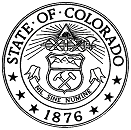![]() The information on this page is archived and provided for reference purposes only. It may be outdated or no longer maintained.
The information on this page is archived and provided for reference purposes only. It may be outdated or no longer maintained.
Buescher seeks clarification from state’s high court
Questions submitted to Supreme Court to clarify Colorado campaign finance law
Denver, February 9, 2010 – Today, Governor Bill Ritter formally asked Colorado’s Supreme Court whether portions of the state’s constitution are now unenforceable following the U.S. Supreme Court’s recent decision in Citizens United v. Federal Election Commission.
In the aftermath of the decision allowing corporations to spend money supporting or opposing candidates, Secretary of State Bernie Buescher immediately convened meetings with legislative leaders, political parties and campaign finance experts to discuss the ruling and how to proceed. Ultimately, Buescher identified two areas of Colorado law that needed clarification. First, whether corporations and labor unions can spend money supporting or opposing candidates and second, whether these entities may make “electioneering communications” or broadcast or printed messages that refer to specific candidates shortly before an election. These practices have been illegal since 2002, following voter approval of Amendment 27.
“At issue is a 183-page decision with impacts to Colorado’s campaign finance laws,” Buescher said. “With the election cycle already underway, it’s imperative that our state and local candidates and the voters have a clear understanding of the laws governing campaign finance.”
Following his discussions, Buescher worked with Ritter to seek guidance from the state’s Supreme Court Justices. Colorado’s constitution contains prohibitions on campaign expenditures by corporations and labor unions in state elections that are similar to federal exclusions that were overturned by the U.S. Supreme Court.
“I appreciate the cooperation of Governor Ritter and legislative leadership from both parties to seek guidance from the state’s Supreme Court Justices,” Buescher said. “It is difficult for legislators and my office to consider legislation and policy issues without knowing the answer to these crucial questions. Hopefully our state’s justices will expeditiously provide the guidance needed for the current election cycle.”
Colorado’s constitution authorizes the legislature or the governor to seek guidance from the state’s Supreme Court justices related to pending legislation or other important questions in rare circumstances. However, as Ritter explains in his request, “While there is no pending legislation, I believe that the unique circumstances here represent a ‘solemn occasion’ warranting the Court’s exercise of jurisdiction.” In addition, legislative leadership from both houses is also expected to endorse the interrogatories, as well.




 Menu
Menu  Search
Search 
